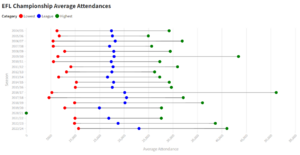EFL Championship facts for kids
 |
|
| Founded |
|
|---|---|
| Country | England |
| Other club(s) from | Wales |
| Number of teams | 24 |
| Level on pyramid | 2 |
| Promotion to | Premier League |
| Relegation to | EFL League One |
| Domestic cup(s) | |
| League cup(s) | |
| International cup(s) |
|
| Current champions | Leeds United 2nd title and 5th second-tier title (2024–25) |
| Most championships |
|
| TV partners | List of broadcasters |
The English Football League Championship, often called the Championship, is a professional football league in England and Wales. It is the highest division of the English Football League (EFL). This league is the second-highest overall in the English football league system, right below the Premier League.
Twenty-four clubs compete in the Championship each season. The league has a long history, going back to the original Football League Second Division, which started in 1892. It became the Football League First Division in 1992. Then, in 2004, it was rebranded as the Football League Championship. Since 2016, it has been known as the EFL Championship. The winning team each season gets the EFL Championship trophy. This trophy was once given to the winners of England's top football league before the Premier League began. Teams from Wales can also play in this league, making it a cross-border competition.
Every season, the two teams that finish at the top of the Championship automatically move up to the Premier League. Teams finishing from third to sixth place compete in a special playoff tournament. The winner of this playoff also gets promoted to the Premier League. On the other hand, the three teams that finish at the bottom of the Championship are moved down to EFL League One.
The Championship is known as the richest football division outside of the top leagues in the world. It is also one of the most-watched leagues globally. For example, in the 2022–23 season, the average number of fans at each match was 18,787. Cardiff City has played more seasons in this division than any other team. Leeds United are the current champions.
Contents
History of the Championship
The Championship started in its current form for the 2004–05 season. Sunderland won the first title after the rebranding. Wigan Athletic finished second, earning promotion to the top league for the first time ever. They had only joined the Football League in 1978. West Ham United won the first Championship play-off final that season.
The 2004–05 season saw a huge number of fans attend matches, with over 9.8 million people watching games. This made it one of the most-attended football divisions in Europe. In the 2005–06 season, Reading set a new record for points in a season, finishing with 106 points.
In 2007, Leeds United faced financial difficulties and was deducted 10 points, which led to their relegation. Later that year, Derby County won the first Championship play-off final at the new Wembley Stadium.
In 2009, Burnley won the play-offs to reach the Premier League for the first time since 1976. The league's sponsorship changed over the years. From 2010 to 2013, it was called the Npower Championship. Then, in 2013, Sky Bet became the new sponsor.
In 2011, Birmingham City became the first Championship club to play in the UEFA Europa League group stage. This happened after they won the League Cup.
A record crowd of 87,348 people watched the 2014 play-off final between Derby County and Queens Park Rangers. QPR won with a late goal.
In 2016, the Football League was renamed the English Football League. The 2016–17 season had over 11 million fans attending games. Newcastle United won the title that season.
In 2020, play in the Championship was paused because of the COVID-19 pandemic. It restarted in June, and Leeds United were confirmed champions in July 2020, returning to the Premier League after 16 years.
More recently, Brentford earned promotion in 2021 after a play-off win. In 2022, Nottingham Forest ended their 23-year wait to return to the top league by winning the play-off final. The league also took a break in late 2022 for the 2022 FIFA World Cup.
How the League Works
The Championship has 24 teams. Each season, which runs from August to May, every team plays every other team twice. They play once at their home stadium and once away. This means each team plays a total of 46 games.
- Teams get three points for a win, one point for a draw, and zero points for a loss.
- Teams are ranked in the league table by the total points they have.
- If teams have the same points, their goal difference (goals scored minus goals against) is used.
- If still tied, the number of goals scored is used.
- If teams are still tied, their head-to-head record for that season is checked.
At the end of the season:
- The top two teams automatically move up to the Premier League.
- Teams that finish in third, fourth, fifth, and sixth place enter the Championship play-offs.
- In the play-offs, the third-placed team plays the sixth-placed team, and the fourth-placed team plays the fifth-placed team. These are two-legged semi-finals (home and away).
- The winners of the semi-finals play in a single final match at Wembley Stadium. The winner of this final also gets promoted to the Premier League.
- The three teams that finish at the bottom of the Championship table are moved down to EFL League One.
Current Teams
Here are the teams playing in the EFL Championship for the 2025–26 season:
League Results
This table shows the champions, runners-up, and play-off winners of the EFL Championship since it was rebranded in 2004.
Top Scorers
Here are the top goal scorers for each season in the EFL Championship:
| Season | Top scorer(s) | Club(s) | Goals |
|---|---|---|---|
| 2004–05 | Wigan Athletic | 24 | |
| 2005–06 | Watford | 21 | |
| 2006–07 | Colchester United | 23 | |
| 2007–08 | Plymouth Argyle Wolverhampton Wanderers |
23 | |
| 2008–09 | Wolverhampton Wanderers | 25 | |
| 2009–10 | Cardiff City | 20 | |
| Bristol City | |||
| 2010–11 | Watford | 24 | |
| 2011–12 | Southampton | 27 | |
| 2012–13 | Crystal Palace | 30 | |
| 2013–14 | Leeds United | 28 | |
| 2014–15 | Ipswich Town | 27 | |
| 2015–16 | Brentford Burnley |
25 | |
| 2016–17 | Leeds United | 27 | |
| 2017–18 | Derby County | 21 | |
| 2018–19 | Norwich City | 29 | |
| 2019–20 | Fulham | 26 | |
| 2020–21 | Brentford | 31 | |
| 2021–22 | Fulham | 43 | |
| 2022–23 | Middlesbrough | 28 | |
| 2023–24 | Blackburn Rovers | 27 | |
| 2024–25 | Leeds United | 19 |
Fan Attendance
The EFL Championship is one of the most-watched second-tier sports leagues in the world. It is second only to Germany's 2. Bundesliga in terms of average attendance. In the 2023–24 season, an average of 23,048 fans attended each game. This makes the Championship the fifth most-watched league in Europe.
The highest average league attendance was in the 2023–24 season, with 12.7 million fans attending matches in total. The lowest average attendance was in the 2013–14 season, with 9.1 million spectators. The highest average attendance for a single club was 51,106 for Newcastle United in the 2016–17 season.
| Season | League average attendance | Highest average | ||
|---|---|---|---|---|
| Club | Attendance | |||
| 2004–05 | 17,417 | Leeds United | 29,207 | |
| 2005–06 | 17,607 | Norwich City | 24,952 | |
| 2006–07 | 18,179 | Sunderland | 31,887 | |
| 2007–08 | 17,027 | Sheffield United | 25,631 | |
| 2008–09 | 17,888 | Derby County | 29,440 | |
| 2009–10 | 17,949 | Newcastle United | 43,388 | |
| 2010–11 | 17,369 | Leeds United | 27,299 | |
| 2011–12 | 17,739 | West Ham United | 30,923 | |
| 2012–13 | 17,493 | Brighton & Hove Albion | 26,236 | |
| 2013–14 | 16,605 | Brighton & Hove Albion | 27,283 | |
| 2014–15 | 17,857 | Derby County | 29,232 | |
| 2015–16 | 17,583 | Derby County | 29,663 | |
| 2016–17 | 20,119 | Newcastle United | 51,106 | |
| 2017–18 | 20,489 | Aston Villa | 32,097 | |
| 2018–19 | 20,269 | Aston Villa | 36,029 | |
| 2019–20 | 18,585 | Leeds United | 27,643 | |
| 2020–21 | No attendances due to COVID-19 pandemic | |||
| 2021–22 | 16,776 | Sheffield United | 27,611 | |
| 2022–23 | 18,787 | Sunderland | 38,653 | |
| 2023–24 | 23,048 | Sunderland | 41,158 | |
| 2024–25 | 22,057 | Sunderland | 40,425 | |
League Performance Over Time
Since the Championship started in 2004, 57 different teams have played in the division. This includes many teams that are now in the Premier League. Cardiff City has spent the most seasons in the league, with 19 seasons. Ipswich Town holds the record for the longest continuous time in the division, staying for 15 seasons from 2004 to 2019.
Currently, Bristol City, Preston North End, and Queens Park Rangers have been in the Championship the longest without being promoted or relegated. They are all playing their eleventh consecutive season in the 2025–26 season.
Norwich City has had six different periods in the Championship, which is more than any other team. There have been 13 different winners of the EFL Championship. Eight teams have won it twice: Burnley, Leeds United, Leicester City, Newcastle United, Norwich City, Reading, Sunderland, and Wolverhampton Wanderers.
Burnley and Norwich City have been promoted from the Championship to the Premier League four times each. Rotherham United has been relegated from the Championship to League One the most times, with five relegations. Many teams have experienced both promotion and relegation from the Championship.
Images for kids
See also
 In Spanish: English Football League Championship para niños
In Spanish: English Football League Championship para niños
 | Leon Lynch |
 | Milton P. Webster |
 | Ferdinand Smith |




